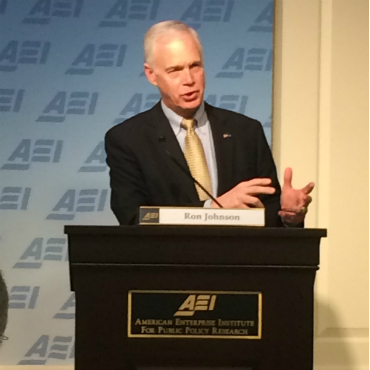Congress needs to catch up on cybersecurity issues
The chairman of the Senate Homeland Security and Governmental Affairs Committee said Congress is lagging on issues such as encryption and securing energy grids from cyberattacks.

Sen. Ron Johnson (R-Wis.) stressed the importance of understanding the complexity of cybersecurity issues.
Congress is lagging on issues related to cybersecurity, including encryption and securing energy grids from cyberattacks, the chairman of the Senate Homeland Security and Governmental Affairs Committee said on Jan. 28.
"I'm not sure anything we do in Washington, D.C., wouldn't do more harm than good," Sen. Ron Johnson (R-Wis.) said during a discussion sponsored by the American Enterprise Institute about the challenges the U.S. faces in cyberspace.
To make an "effective, efficient and accountable type of government," Johnson stressed the importance of understanding the complexity of the issues at stake. He added that there is a "denying of reality across the board."
He was critical of how long it took to pass the Cybersecurity Information Sharing Act of 2015. The legislation establishes a legal framework for the private sector to share cyberthreat information with the government. "Why did it take us five years to take that first step?" he asked.
Johnson also said the vulnerability of energy grids is not being adequately addressed. "Attackers are multiple steps ahead of the good guys trying to reel them in," he added. And the use of electromagnetic pulse weapons is an issue that "nobody is taking seriously."
On encryption, Johnson said Congress is "way behind" in understanding the complexities of the challenges. He said the private sector has a better handle on protecting its assets from cyberattacks.
Rep. Michael McCaul (R-Texas) and Sen. Mark Warner (D-Va.) will introduce legislation to create a commission that would bring together leaders from academia, law enforcement and technology firms to address some of those challenges.
"I think it's a good sign we are involving the technology companies, and we are having full discussions with them," Johnson told FCW. "That's how we are going to be able to lay out these issues and these problems so that we fully recognize the issues at stake."
But not everyone is keen on the idea of delegating policy decisions to a diverse commission.
"If you have a commission representative of all viewpoints, they will come to no conclusion," said Claude Barfield, a resident scholar at the American Enterprise Institute. "They will divide."
NEXT STORY: U.S. warned of exploit in Ukrainian cyberattacks





